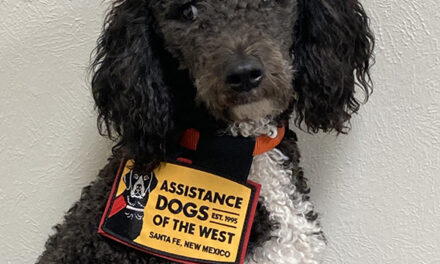We can’t turn on the television or radio these days without hearing about the COVID vaccine and its boosters. As usual, anything that affects humans gets way more attention and airplay than anything involving animals — even though their survival is intimately connected to our own. The reality is that vaccinating animals is and has always been vitally important to their health and welfare — and ultimately to ours as well.

Colleen Dougherty
In the late 1880s, Louis Pasteur created the vaccine for rabies, a fatal disease that’s also zoonotic, meaning that it affect both animals and humans. That vaccine is now one of the core vaccines given to cats and dogs, ferrets, cattle, and even wildlife. It’s also required by law in most states.
But rabies isn’t the only killer lurking about. Recently in New Mexico, shelters, vet clinics and rescues have been seeing a rise in cases of some very deadly diseases, with tragic consequences that are remarkably (though not surprisingly) similar to the same tragedies we’ve been experiencing with COVID.
Canine parvovirus is a highly contagious and aggressive virus that can kill a dog in less than three days. It starts in the intestines, and after doing terrible damage there, secondary infections (including sepsis) can take a dog’s life quickly. There’s no cure, only supportive care until the animal either recovers or dies.
Distemper, another highly-contagious virus that begins in the respiratory tract and eventually ends up in the central nervous system, is also a killer. Puppies may die in a few weeks, while older dogs may survive the respiratory phase (which can include pneumonia) only to succumb to seizures, tremors, or death later on.
Feline panleukopenia was once a leading cause of death in cats. Today, kittens are the most severely affected by this highly contagious and aggressive virus along with otherwise ill and/or unvaccinated cats. This virus “infects and kills cells that are rapidly growing and dividing, such as those in the bone marrow, intestines, and the developing fetus.” (AVMA) The disease causes lethargy, loss of appetite, vomiting, fever, diarrhea and severe dehydration. Death may occur within a week.
Also on the rise lately is feline calicivirus, which starts by ravaging the lining at the back of the mouth before spreading to the tongue and gums, causing painful ulcers. It may then move into the lungs, causing pneumonia. Cats have difficulty eating and experience weight loss and dehydration. Pregnant cats may abort their litters. Kittens and older cats suffer the most severe symptoms. Treatment involves supportive care, antibiotics for subsequent bacterial infections, and isolation. Without that, up to 90 percent of cats will die.
These viruses have a lot in common. None (except rabies) are zoonotic (meaning humans can’t catch them.) They’re highly contagious between animals, and can live for days, weeks, or months on surfaces like floors, bowls, beds and clothing, making disinfection a monumental task, especially in shelters and other congregate settings.
Treatment requires a great deal of time, cost, manpower and isolation — other things that are difficult if not impractical in such settings. They cause a lot of suffering and heartbreak for foster parents, who watch sick animals in their care waste away, in families whose new puppy or kitten suddenly crashes and dies within days of bringing them home, and for shelter workers who, just like human health care workers during this pandemic, watch helplessly as their animals are overtaken by a virus and die or have to be euthanized.
Puppies, kittens and unvaccinated animals are most at risk. Most importantly, all can be prevented with one simple thing: a vaccine.
Vaccines for these diseases have been around for decades and are included in the combo shot for dogs (called DAPP) and cats (FVRCP.) Along with a rabies vaccine, these form a protective shield against these deadly viruses.
Now for some good news: Thanks to a partnership between four amazing organizations, Valencia County now has spay/neuter/ vaccine clinics up and running every Monday at the shelter’s clinic building. They’ve been well received so far — and busy!
Contact them in advance at hartnm.com or on the shelter and “All for Animals” Facebook pages for more information and to secure a spot.
An Albuquerque affiliate, Express Vet on Carlisle (505-508-4527) also holds vaccine clinics 4 days a week. Core vaccines at all these locations are free. Rabies vaccines and microchips are also available at nominal cost.
Please take advantage of these opportunities. Together we can halt overpopulation and help stop the spread of these terrible diseases.
(Colleen Dougherty’s history in animal welfare includes work in a veterinary clinic, shelters in Santa Fe and Albuquerque, and currently as a volunteer for the Valencia County Animal Shelter. She has been a speaker at the New Mexico State Humane Conference on three occasions, presenting talks on caring for small mammals in the shelter setting, and compassion fatigue in animal welfare. She holds degrees in art and counseling therapy, and certificates in eco-psychology and feline massage therapy.)
















